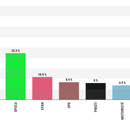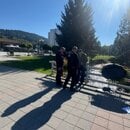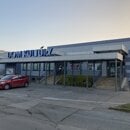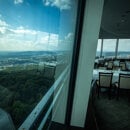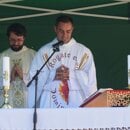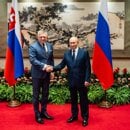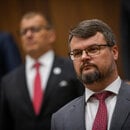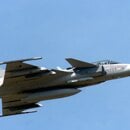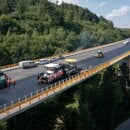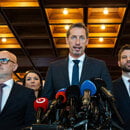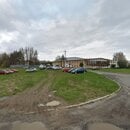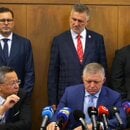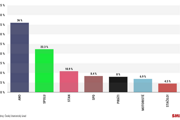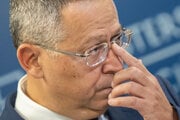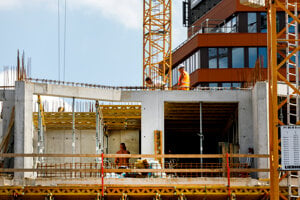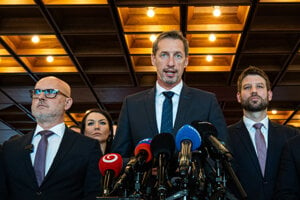alist group Greenpeace gathered outside the Soviet-designed nuclear plant, which is due to begin operating in June or July. It has been widely criticised by both Western and domestic environmentalists as outdated, dangerous and unreliable. "The reactor in Mochovce would not gain permission for operation in any EU country, due to its safety shortcomings," Slovak Greenpeace said in a statement on Monday. Neighbouring Austria, which fiercely opposes nuclear power programmes, has also expressed concern and an Austrian delegation of experts will visit the plant next month. The Slovak government denies charges that the plant is unsafe, saying that it has upgraded it in line with International Atomic Energy Agency recommendations, including the adoption of a Siemens control system and changes in primary and secondary circuit systems. Work on the plant at Mochovce, which is around 120 km (75 miles) from the Austrian border, began in the mid-1980s, but was suspended in 1989 after the project ran into financial problems and required safety upgrades. The first reactor is scheduled to be completed by the end of June and the second by the end of March 1999. Slovenske Elektrarne spokeswoman Alena Melicharkova said nuclear fuel was being loaded into Mochovce`s first reactor on Monday morning and that further details would be released later. "Today we`re starting to load the first block in Mochovce with the fuel," Melicharkova told Reuters. Greenpeace said: "Nobody asked us, inhabitants of this country, whether we want or not to have this dangerous energy resource close to our homes." Sunday was the 12th anniversary of the world`s worst nuclear accident at the Chernobyl plant in Ukraine which borders Slovakia to the east. Slovenske Elektrarne already runs the Jaslovske Bohunice nuclear power station in western Slovakia about 70 km (45 miles) from the Austrian border. In March, SE said it had signed a contract in Moscow with Russian nuclear fuel maker OAO TVEL to supply Slovak nuclear power stations after 1999. TVEL is a Russian concern which manufactures, produces and exports nuclear fuel rods.
SME
Sobota, 4. október, 2025 |
Meniny má František
28. apr 1998 o 0:00
Slovakia Begins Loading Nuclear Fuel into reactor in Mochovce
BRATISLAVA (Reuters) - Slovakia`s state-owned electricity generator said it had begun loading nuclear fuel on Monday into a reactor at its controversial Mochovce power plant. The announcement by Slovenské Elektrárne came as protesters from the environment
Najčítanejšie na SME
- 1 . Výsledky českých volieb 2025: České voľby vyhrá Babiš, koalícia s komunistami je mimo parlamentu (minúta po minúte) 44 498x prečítané
- 2 . Priebežné výsledky českých volieb 41 811x prečítané
- 3 . V Považskej Bystrici napadol senior člena strany Demokrati 7 970x prečítané
- 4 . Poslanecký klub Slovensko, Za ľudí, KÚ po odchode Vašečku mení svoj názov 6 842x prečítané
- 5 . Medzi mestom a obcou sa zrazil vlak s autom. Dopravu prerušili 3 901x prečítané
- 6 . PS nenapadne novelu ústavy na Ústavnom súde, ani na Európskom súde pre ľudské práva 3 243x prečítané
- 7 . Ruská asociácia robí za štátne akciu na Spiši s podporou prednostu. Poslanec vidí provokáciu 2 917x prečítané
- 8 . Róbert Mak: Pikantný prestup do Ferencvárosu, dočká sa telefonátu od Calzonu? (MVP Talkshow) Video 2 879x prečítané
- 1 . Výsledky českých volieb 2025: České voľby vyhrá Babiš, koalícia s komunistami je mimo parlamentu (minúta po minúte) 46 539x prečítané
- 2 . Priebežné výsledky českých volieb 41 811x prečítané
- 3 . Miliardové škody, núdzová pomoc. Jaguar má ešte väčší problém ako sa zdalo, týka sa to aj Nitry 32 436x prečítané
- 4 . Mala pripomínať fľašu vína, vyjsť úplne navrch by bolo nezdravé. Bratislavská dominanta má 50 rokov Foto 24 251x prečítané
- 5 . Voľby v Česku 2025: V Bratislave prišlo už v prvý deň voliť viac Čechov ako naposledy za oba dni (minúta po minúte) 18 066x prečítané
- 6 . Študoval na Pápežskej univerzite, rok strávil na misii v Oceánii. Cirkev nie je dokonalá, hovorí novokňaz 17 066x prečítané
- 7 . Drony blokujú letiská, zostreliť ich je drahé. Aké možnosti má Európa? 16 705x prečítané
- 8 . Plochá Zem neuspela ani u voličov SNS, najväčšiu sebareflexiu v prieskume ukázal volič Hlasu 15 102x prečítané
- 1. Zo Slovenska mal jeho 3D model urobiť svetový unikát. Je z toho fiasko, ktoré vyšetruje polícia 66 143
- 2. Výsledky českých volieb 2025: České voľby vyhrá Babiš, koalícia s komunistami je mimo parlamentu (minúta po minúte) 46 539
- 3. Ukrajina očakáva kľúčový zlom vo vojne. Dostane stroj stavaný na vojnu s Ruskom 45 974
- 4. Miliardové škody, núdzová pomoc. Jaguar má ešte väčší problém ako sa zdalo, týka sa to aj Nitry 44 583
- 5. Výstavba rekordného mosta ide do finále, už čoskoro bude slúžiť vodičom Foto 42 878
- 6. Priebežné výsledky českých volieb 41 811
- 7. Analýza opozície po novele ústavy: KDH si môže privodiť koniec v parlamente, víťazom môže byť SaS 41 611
- 8. KDH pred dôležitým víkendom: Mikloško na radu nepríde, Majerský to chce vidieť "z očí do očí" 40 874
- 1 . Fotka sláviaceho Slováka obletí svet. Rýchlo reagoval a veľký Real dostal lekciu Foto 73 988
- 2 . Zo Slovenska mal jeho 3D model urobiť svetový unikát. Je z toho fiasko, ktoré vyšetruje polícia 66 143
- 3 . Ukrajina očakáva kľúčový zlom vo vojne. Dostane stroj stavaný na vojnu s Ruskom 63 932
- 4 . Ekonomický zázrak na východe? Firma prevzala biznis model a otáča milióny 53 960
- 5 . SEPS zrušil párty za 135-tisíc eur. Vystúpiť mali Kandráčovci aj Juraj Bača 51 333
- 6 . Štyri dni po schválení konsolidačného balíčka hovoria o zmene. Dôvodom sú živnostníci 47 749
- 7 . Výsledky českých volieb 2025: České voľby vyhrá Babiš, koalícia s komunistami je mimo parlamentu (minúta po minúte) 46 539
- 8 . Miliardové škody, núdzová pomoc. Jaguar má ešte väčší problém ako sa zdalo, týka sa to aj Nitry 44 583
Komerčné články
- Projekt, ktorý mení životy tisícke slovenských pacientov
- Od Araratu po Karibik. Tieto zájazdy prebudia chuť objavovať
- Úspech firemnej elektromobility: eFleet Day 2025 Truck&Bus&Van
- Odchod detí je veľký zlom, sloboda je často len ilúzia
- Andrej Viceník, VÚB: Samosprávy potrebujú partnera, nielen banku
- Keď sa z brigády stane kariéra
- Pacienti s akútnou myeloidnou leukémiou čakajú na moderné lieky
- Jesenný literárny výber vložený v denníkoch SME a Korzár
- Projekt, ktorý mení životy tisícke slovenských pacientov
- Od Araratu po Karibik. Tieto zájazdy prebudia chuť objavovať
- Cédečka sa predávali ako teplé rožky. Prežili, lebo predvídajú.
- Po oslavách storočnice sa košický maratón pozerá do budúcnosti
- TIPOS pokračuje v spolupráci s Bratislavou
- IMPERIAL Gold… viac ako zlato...
- Odchod detí je veľký zlom, sloboda je často len ilúzia
- Úspech firemnej elektromobility: eFleet Day 2025 Truck&Bus&Van
- Odchod detí je veľký zlom, sloboda je často len ilúzia 10 605
- Projekt, ktorý mení životy tisícke slovenských pacientov 9 540
- Keď sa z brigády stane kariéra 5 698
- Pacienti s akútnou myeloidnou leukémiou čakajú na moderné lieky 2 618
- Firma z Nitry robí miliónové projekty pre Teslu či TikTok 2 198
- Od Araratu po Karibik. Tieto zájazdy prebudia chuť objavovať 2 130
- Na trhu kúpite datle aj ťavu. Maroko má vlastný púštny Hollywood 1 964
- Cédečka sa predávali ako teplé rožky. Prežili, lebo predvídajú. 1 510

